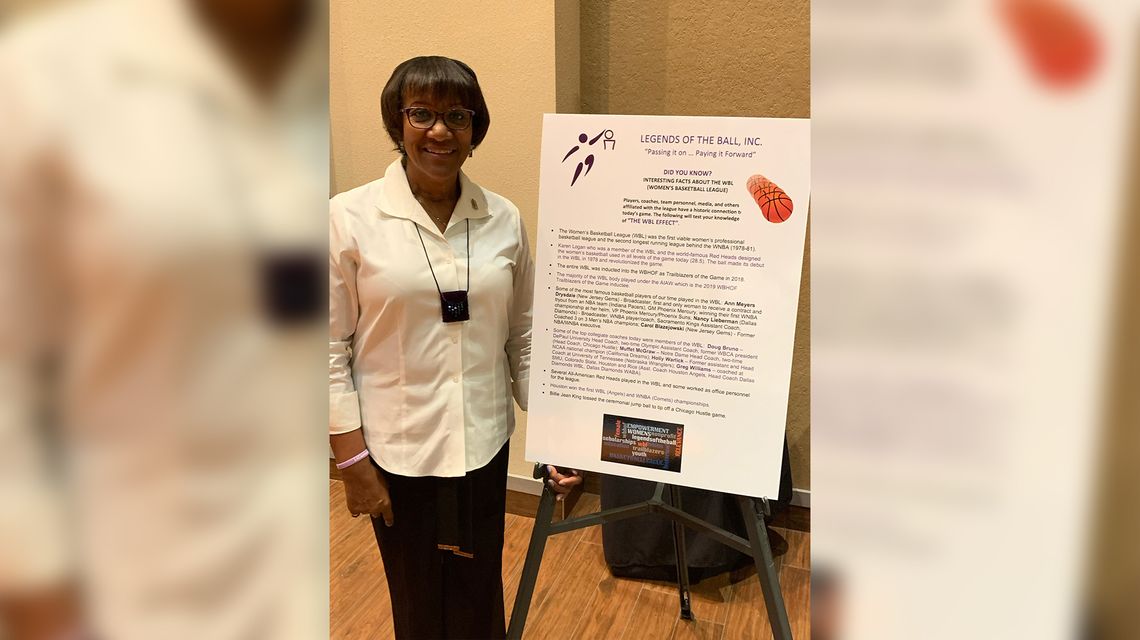
Hall of famer Liz McQuitter helped lay groundwork for women’s professional basketball
ROCKDALE, Texas (BVM) — If you were to think of trailblazers in the sport of basketball, you might think about Michael Jordan, LeBron James or Steph Curry. Rightfully so considering those players forever changed the game of basketball. However, in the late 1970s, the first professional women’s basketball league was created, And at the forefront of it all was Liz McQuitter.
Before becoming a pioneer for the game she loves, she had to familiarize herself with the game. That’s exactly what she did at Rockdale High School where she excelled at the game of basketball. Known for her tenacious defensive play, McQuitter was a force to be reckoned with. Not only did she wreak havoc on the defensive side of the ball, but she had the same energy on the offensive side as well.
After a successful high school career where she played all four years at the varsity level and led Rockdale to the Class 3A state championship game, McQuitter went on to play at the junior college level in 1975. McQuitter played at Temple Junior College under Fran Garmon who was inducted in the Women’s Basketball Hall of Fame in 2000. Garmon also started the women’s basketball program at Temple Junior College, finished with 383 win, and defeated the UCLA women’s team in a national invitational tournament.
McQuitter was a main part of a team that won the NJCAA National Championship for TJC in 1975.
“We won the first-ever sanctioned NJCAA National Championship,” McQuitter said. “We got the first of everything in our group.”
After winning the first-ever NJCAA Championship, McQuitter went on to play at the University of Nevada-Las Vegas (UNLV). The program was a year old at that time and Dan Ayala had been named the head coach. Originally part of Jerry Tarkanian’s coaching staff, Ayala was ready to be a head coach. Wanting to implement the fast break into the program, he recruited players such as McQuitter and Debby Waddy-Rossow and Kathy Oliver.
“Coach Garmon and Coach Ayala’s impact was tremendous,” McQuitter said. “We really played like the men did. It was a precursor of where the game was moving. We learned it because he learned from coach Tarkanian. But I learned everything from coach Ayala. Not just about the skills but life skills. He was one of the most influential people in my life. My coaches have impacted my life greatly.”
Pegged with setting the groundwork for the program’s future, players like McQuitter helped Ayala do that and more. During his first season, McQuitter and the Lady Rebels finished with an overall record of 26-5.
Following a successful start to the program, the 1977-78 Lady Rebels jumped out to a 15-0 record. They finished 23-2 overall, only losing to Kansas State in the regular season and UCLA in the third round of the Association for Intercollegiate Athletics for Women (AIAW) tournament. It was one of four times the Lady Rebels made the tourney.

That was McQuitter’s final year at UNLV and Ayala would leave the program the following season. He left the program as one of its winningest coaches with 109 wins.
Following her last year at UNLV, McQuitter still had the competitive spirit to play basketball. Luckily enough for her, there was a women’s professional basketball league set to begin. As the interest in college and international basketball began to rise, a man by the name of Bill Byrne decided it was the time for a professional women’s basketball league.
“There was the usual skepticism [surrounding the launch],” McQuitter said. “We had to go out and show that we could play this game and we ended up gaining respect [doing that]. We applaud those men and women, especially Billy Byrne, who was the original founder for believing in a product. He believed it was marketable, valuable, and it had quality.”
When you have a product you’re trying to sell, does it have quality, is it marketable, does it have value? He saw that the league had that and it took off.”
With 14 teams, the WBL tipped off its season in 1978. Fortunately for McQuitter, she was able to be part of the first women’s professional basketball game in the United States. Her Chicago Hustle traveled to Milwaukee, Wis. to take on the Milwaukee Does. A crowd of 7,824, fans saw the Chicago Hustle take down the hometown team 92-87. CBS Evening News even covered the league’s inaugural game.
McQuitter would continue to play for the Chicago Hustle until the league was dissolved in 1981. The WBL laid the groundwork for the future of women’s professional basketball in the United States.
“How can you judge how far you’ve come or how monumental that is if you don’t know we played for $ 5,000?” McQuitter said. “How can you celebrate new history when you don’t know your old or complete history?”
Earlier this year, the WNBA and the WNBPA agreed to a new collective bargaining agreement where it allows players to earn up to $500,000. The WBL “set the tone” for the WNBA today.
After playing in the WBL, McQuitter started her coaching career. For 20 years, she coached at the collegiate level. She was the women’s head coach at Mundelein College, Lamar University and Northern Illinois University. She led NIU to the NCAA tournament with a 17-14 record in 1995. She also was an assistant coach at DePaul and Texas A&M.
After the 2002 season at Texas A&M, she moved back to her hometown of Rockdale and began to teach. But she found herself once again coaching, this time at the high school level.
“I had never coached high school before,” McQuitter said. “I was like, ‘Oh no.’ But I made the adjustment and coached for eight years and stepped away from coaching again.”
One highlight for those eight seasons came in 2015 when she led the team to the state tournament for the first time since her junior year in 1972. She decided to step away from coaching until one of her former players from Texas A&M, Kerrie Patterson-Brown started charter school Legacy School of Sports Science. She coached for two years there and stepped away from coaching again.
“She pulled me back in,” McQuitter said. “I just stopped this year. It was my last year of coaching.”
Currently, McQuitter is part of a nonprofit organization called Legends of the Ball inc. After being inducted into the Women’s Basketball Hall of Fame in 2018 as a trailblazer for basketball, McQuitter decided to start this nonprofit organization which tells the stories of those players, teams, and leagues that came before.
“On the board, there are seven coaches from every level,” McQuitter said. “From middle school, high school, the ABL, the WNBA, the Olympic team, someone has coached at one of those levels. We have never left the game.”
McQuitter and the organization continue to tell stories of those who laid the groundwork for women’s sports, emphasizing the importance of educating people about those who came before them and what they did for future generations.
“While our platform is a sports platform, social relevance is a big part of what we do,” McQuitter said. “We promote the historical and social relevance. And not only did we change the landscape for sports, women’s professional basketball, women’s college basketball, we changed it for basketball at every level.”







